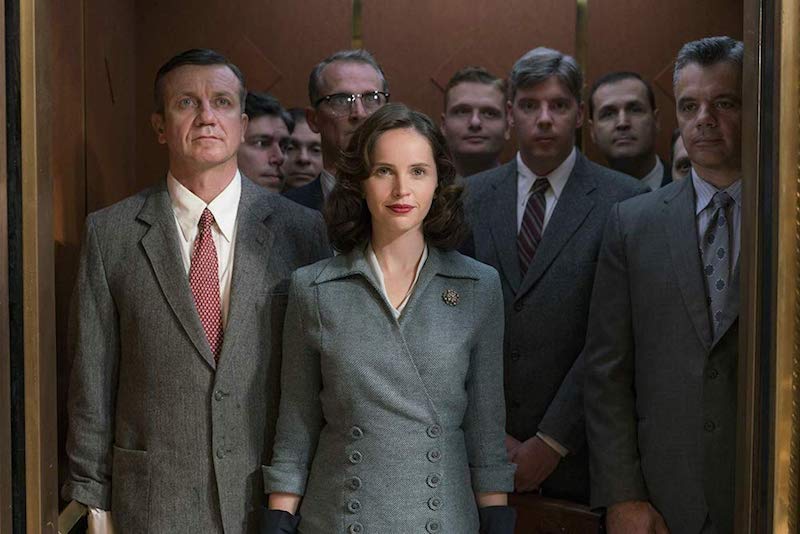Almost half a year after the documentary “RBG” raked in $14.3 million, “On the Basis of Sex” tells how Ruth Bader Ginsburg began her trailblazing Women’s Rights Project at the American Civil Liberties Union. The film made its world premiere last week as the opening gala movie for the 32nd AFI FEST in Hollywood. If ever we needed a real-life superhero during these dark days in Trumpland, then the now 85-year-old RBG has become just that.
Earlier in the day, RBG was trending because she had been hospitalized with three cracked ribs. Director Mimi Leder introduced this legal love story to the audience, saying that “our thoughts are with her and we pray for her speedy recovery.” She and the cast had a good first-hand source confirm that RBG was doing well because the screenwriter, Daniel Stiepleman, is her nephew.
On a panel discussion the previous week at the Pacific Design Center, Stiepleman explained he first heard of the story at his uncle Martin Ginsburg’s 2010 funeral. The couple, Martin and Ruth, whom Stiepleman deeply admired for their long-lasting devoted marriage, had only worked together on one case: A Colorado man was discriminated against on the basis of sex in a state tax law because he was not a female caregiver to his elderly mother.
The movie’s beginning reveals Leder’s roots as a cinematographer. A large group of young fresh faces are flowing into old building, an ancient piece of architecture for the young country of the United States. In a sea of white shirts, conservative ties and gray to black suits, is a single woman (Felicity Jones) dressed in a cornflower blue dress and walking confidently in pumps. As she finds a seat amongst the men and they wait for the dean to speak, the soundtrack plays the Harvard fight song about “ten thousand men of Harvard want vict’ry today.” Once seated, she looks around for faces of other young women and spies two sitting close by.
This isn’t the start of Ruth Bader Ginsburg’s college career. She had already earned her bachelor’s at Cornell University and was married to Marty (1954) and by 1956, they had a child, Jane. Marty (Armie Hammer) was a year ahead of Ruth in law school. We learn the necessary bits later through subtle exposition.
During his welcome speech to the new law students, the dean, Erwin Griswold (Sam Waterston), asks them all to “consider what does it mean to be a Harvard man.” Later, Ruth complains to her husband while trying to decide which dress will make her look most like “a Harvard man” for a dinner with the dean. At the dinner arranged to greet the new female students, we learn that 1956 was only the sixth year that “women had the privilege to earn a Harvard law degree” and Ruth was one of nine women out of a class of over 500. Griswold asks each to explain, “Why you occupy a place at Harvard that would have gone to a man.”
And so begins the parallel worlds where Ruth is fully supported by an astoundingly modern egalitarian husband at home and yet faces subtle and overt sexism in her academic and professional life. When Marty is diagnosed with cancer, she attends his classes when he can’t and types his work when he is too weak to sit up and still takes care of their daughter, Jane. When Marty finds a job in New York, Ruth asks Griswold to make an exception—one already made for at least two men before her—but failing to find his support (“You have no compelling reason to transfer” and as dean he has a duty “to protect the distinction of a Harvard law degree”), she transfers to Columbia where she will graduate tied for first in her class.
Yet despite being in the largest city of the most “litigious” society in the world, in New York City in 1959, Ruth cannot find a job because she is a woman, a mother, a Jew and a distraction. She settles, as many women before, to teach when a position opens up because one token minority (black) has left and a woman fulfills the notion of diversity. Ruth hasn’t relinquished her dreams of finding equal footing in the courtroom. By 1976, she is stirring up predominately female students to examine sex discrimination in the law nationwide when she discovers a case and she tries to talk an old buddy, ACLU legal director Mel Wulf (Justin Theroux), into adding the ACLU’s support. Wulf recognizes that this would engender what the opposition’s legal team will later call “radical social change,” but eventually, Ruth will find her voice and she will see it as protecting “the right of our country to change.”
Leder knows the terrain of sexism and being a pioneer. She was the first women accepted in cinematography and the first female graduate of the AFI Conservatory in 1973. The new festival director, Michael Lumpkin, who just this year replaced Jacqueline Lyanga who served for eight years, boasted before this movie’s screening that 48 percent of the 135 films shown at the festival were directed by women.

Daniel Stiepleman’s script and Leder’s movie have the full blessing of Notorious RBG (Stiepleman said when he asked permission to write about the case, RBG told him, “Well, if that’s how you want to spend your time.”) as does the casting of the handsome Armie Hammer. Hammer and Jones have a sweet chemistry and they might make the story visually more agreeable as is the Hollywood way. Waterson brings all the “Law & Order” baggage of respect effectively to his role as the old establishment sexist heavy who reappears in Ruth’s life as US Solicitor General during this case. In contrast, the movie includes brief appearances by Kathy Bates as a feisty but weary feminist civil liberties lawyer and ACLU board member Dorothy Kenyon (1888-1972). This is a movie that floats on an atmosphere of admiration, but also one that solidly appreciates what it is like to be a pioneer for social change.
One quibble with “On the Basis of Sex” is that it skips over the 1960s when RBG researched International Civil Procedure in Sweden and learned how gender equality worked in another country. That might have given “On the Basis of Sex” a sense of global context, particularly when you consider that Margaret Thatcher was the leader of the Conservative Party in the UK from 1975 to 1990. Yet “On the Basis of Sex” still has potent emotional power. Even viewing it a second time, I felt a sting of tears and a heaviness in my heart. I’ve been where sexism and discrimination pushed me back but I must also admit that I was so delighted by the documentary “RBG” that I bought an RBG action figure.
“On the Basis of Sex” is the origin story of a superhero who doesn’t need a cape, whose super power was her relationship with her husband in an intellectual and emotional equal partnership, and, in this imagining, has blue as a motif (the movie ends long before RBG wears her trademark jabots). “On the Basis of Sex” is a primer for men and women about social change and sexism, how one person can change the world one case at a time and how a marriage between equals can lift both partners up, even as far as the Supreme Court of the United States.












